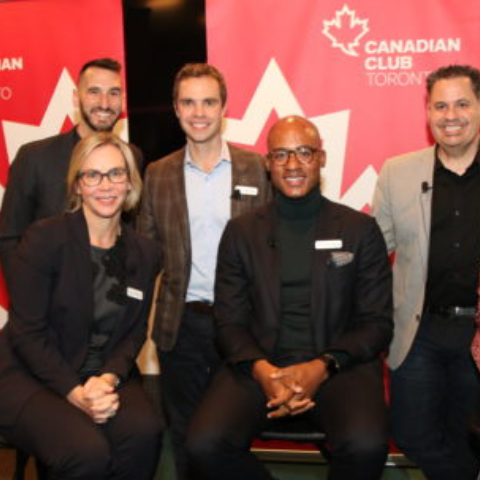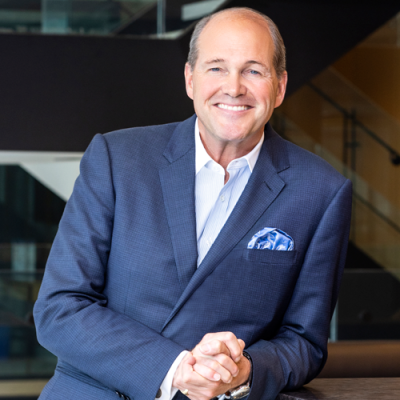Beyond the Podium

“The Power of Networking”, Canadian Club Toronto’s panel on making connections to build career pathways, took place on November 14th, 2017. Gillian Riley (EVP, Canadian Commercial Banking, Scotiabank), Andrew Graham (CEO, Borrowell), David Simmonds (VP Enterprise Strategy, McKesson) and Pam Warren (Partner, Egon Zehnder) took part in the event hosted by Director Jake Hirsch-Allen at LinkedIn Canada headquarters. Perry Monaco, Head of Customer Success at LinkedIn joined as the moderator for this evening event.
Hirsch-Allen opened by reminding the crowd of the long-held wisdom we’ve heard one time or another: It’s not what you know, it’s who you know; generally, anyway. A self-described “hyperactive networker”, Hirsch-Allen found his home at LinkedIn helping users make powerful connections that advance their careers and pathways. After introducing the panel and saying a few words about what success in networking can lead to, Monaco took the reins.
Monaco recalled his first meeting with Hirsch-Allen as an example of how our pathways can be very linear, or full of “zigs and zags” – the latter applying to Hirsch-Allen who left law to join the networking site. He then posed the same question to the panel: “What was your career path like?” Was it meticulously planned or did it also have zigs and zags? Simmonds, Vice President of Enterprise Strategy at McKesson, was first to answer. Coming from a Jamaican immigrant family, becoming a professional of some sort was expected, he said. “My mother still has my law school admission letter in a shoebox.” Taking a job with Navigator the summer before heading off to school invigorated new passions, and the Chairman of the company at the time encouraged him to follow his heart or risk wasting his time. Following his original path and venturing into new worlds were both risks, he acknowledged, but ultimately lead to his success. Warren chimed in, saying that her parents’ belief in her allowed her to explore her career path along the way. She stressed the importance of listening to the “what about’s…?” and being willing to learn and get exposure. The freedom to explore and to have the support to back it up is something she hoped to pass onto her children.
Monaco kept the ball rolling, asking the panel to name the best connection they’ve ever made. Riley had didn’t zero in on one person specifically, but gave credit to anyone who had ever challenged her to work outside her comfort zone and to the people who gave objective advice and feedback. Graham named friend and co-founder of Borrowell, Eva Wong, as someone who is not only an important voice in the tech world, but someone whose skills are directly complimentary to his.
Addressing a common fear of people looking to network, Monaco asked the panel for tips on how to approach someone about getting in touch with their circle without being too “invasive or salesy”. Warren encouraged people to be specific in what they are asking. Instead of a broad plea asking for connections, outline how you think the person on the other end could help you, or ask if they could point you in the direction of a couple different people to chat with, she said. Graham takes a “double opt-in” approach, having those that want to make a connection write an email to the person they would like to be connected with stating why they think it would be a beneficial bridge. Simmonds employed a family favourite phrase: “You should do all the good you can to all the people you can.” He explained that he thinks a lot of people are “obsessed with connection culture” that really only allows for shallow relationships. He prefers to know someone on a deeper level that has common goals when making introductions.
The world of social media has most certainly changed the way we network, Monaco said. “In theory, it should be easier.” However, there ends up being a lot of noise. Considering that, he asked about the role of social media and smartphones in networking. Warren, a recruiter by career, shared the fear that a lot of search professionals had about LinkedIn at its conception: it would “disintermediate” their business. As it turned out, the site was a powerful tool. Social media has allowed recruiters to speed up connections and find information on prospective candidates more readily, she said. Riley emphasized the importance of being thoughtful about what you post online. Simmonds agreed, adding: “You can’t correct the record if the source is you…content is king.”
“If you don’t think you have a social media strategy, you’re wrong.” Monaco said bluntly. Your strategy is what people get when they search your name. “…if you don’t know what’s there, you don’t own it.” These results contribute to your personal brand. He then asked the panel for their advice on building this brand. Riley affirmed how important it is to have one, but that it needs to be authentic. It needs to be inclusive of your strengths but also has to differentiate you from others and you need to be able to articulate it quickly and off the bat, she said. Warren echoed this, suggesting that people test their personal brand with people that know and love them. As in, explain what you think your personal brand is and then ask others if they get that sense from you. Graham said that personal branding is important but it means very little if you don’t have something successful to market. Simmonds advice was simple: make sure you are doing a good job at your current place of work before applying elsewhere. Otherwise, you won’t have credibility elsewhere.
After much lively discussion and banter from the panel, the evening veered into Q&A period. The first question concerned how the panel would brand themselves and get connections if the internet wasn’t an option. Riley answered first, saying that she didn’t think it would be much different, as social media is just a tool and good connections can still be made through phone calls and during meetings. Although, she acknowledged it would include more face-to-face interaction. Monaco agreed, sharing that he thinks social media is just an extension of what we should be doing in real life.
Next, an audience member wondered about how those on the panel would feel if a candidate didn’t share their social media handles. Warren shared that she generally searches candidates that she’s excited about immediately, but also that it depends on the role you’re applying for. As a rule of thumb, jobs in industries like public relations, communications and marketing would benefit from a public profile. Riley chimed in, saying she would likely not look at someone’s Twitter feed.
When questioned about how many connections really are enough, Warren’s philosophy is quality over quantity. However, she pointed out that generations behind hers do have to think about numbers in certain industries that demand a large following, like modelling and blogging.
“Are there things people are doing wrong when they reach out to you, when it comes to networking?” asked an attendee. Simmonds referenced advice given earlier, that it is imperative to be specific in what you’re asking. As well, know the difference between a mentor and a sponsor as they can have two very different outcomes. Monaco added his two cents, saying that being disingenuous was the biggest networking faux-pas.
The final question of the night was the culmination of everything that had been said: “Why?” As in, why would a member of the panel go out of their way for someone they’ve never met? Monaco said simply: “Karma.” Riley said she usually helps those that are willing to get and give and those that can help her learn something new. Simmonds was frank, acknowledging that sometimes professionals just need to take a chance on people. He also pressed the importance of looking for talent in “non-traditional communities.”
“The Power of Networking” audience was a mix of people from all walks of the Toronto scene. In a world that is changing and innovating at a rate that is faster than even our smartphones can keep up with, the way we do business is no exception to that. At the end of the day, the running theme of the night was putting the humanity back in making connections. Our willingness to learn and be honest and genuine will spell out continued success in all industries, and will change the way we all work as a whole.
David Simmonds really said it best: “The greatest gift I’ve ever got from two different leaders is the permission to bring my whole self to work…As we work in a different society, we look differently, we sound different, we love differently. Have the courage to bring your full self to the table and if you can’t at that employer and in that environment, then they’re not good enough for you.”
——————————————————————————————————-
If you’d like to know more about Canadian Club Toronto or our upcoming events, find us on Twitter: @CdnClubTO, Instagram: @CdnClubTO or Facebook: Canadian Club Toronto.
Special thanks to our panel for taking the Canadian Club Toronto stage. Thanks extended to Canadian Club Toronto Director Jake Hirsch-Allen for hosting.
Upcoming Events
Upcoming Events

Event Image List - multi_panelists (showing Featured Image)
Wednesday, April 23, 2025
Natan Obed (Inuit Tapiriit Kanatami), Sean Boyd (Agnico Eagle), Heather Exner Pirot (Macdonald-Laurier Institute) & Jessica Shadian (Arctic360)

Event Image List - featured
Wednesday, April 16, 2025
President and Chief Executive Officer, OMERS
Divider – White
Sign Up
Don’t miss out
Sign up to receive updates on upcoming events and speakers.
Divider – White
Become a Member

Become a Member
Members can enjoy the benefits of access to our archives, advance notice of exclusive events, discounts & more!

![Final_0955[18] Final_0955[18]](https://www.canadianclub.org/wp-content/uploads/elementor/thumbs/Final_095518-e1742392222835-r33c3qvbnb2y1kmgek3xc11ydz5nksyb77ndddolgg.jpg)
